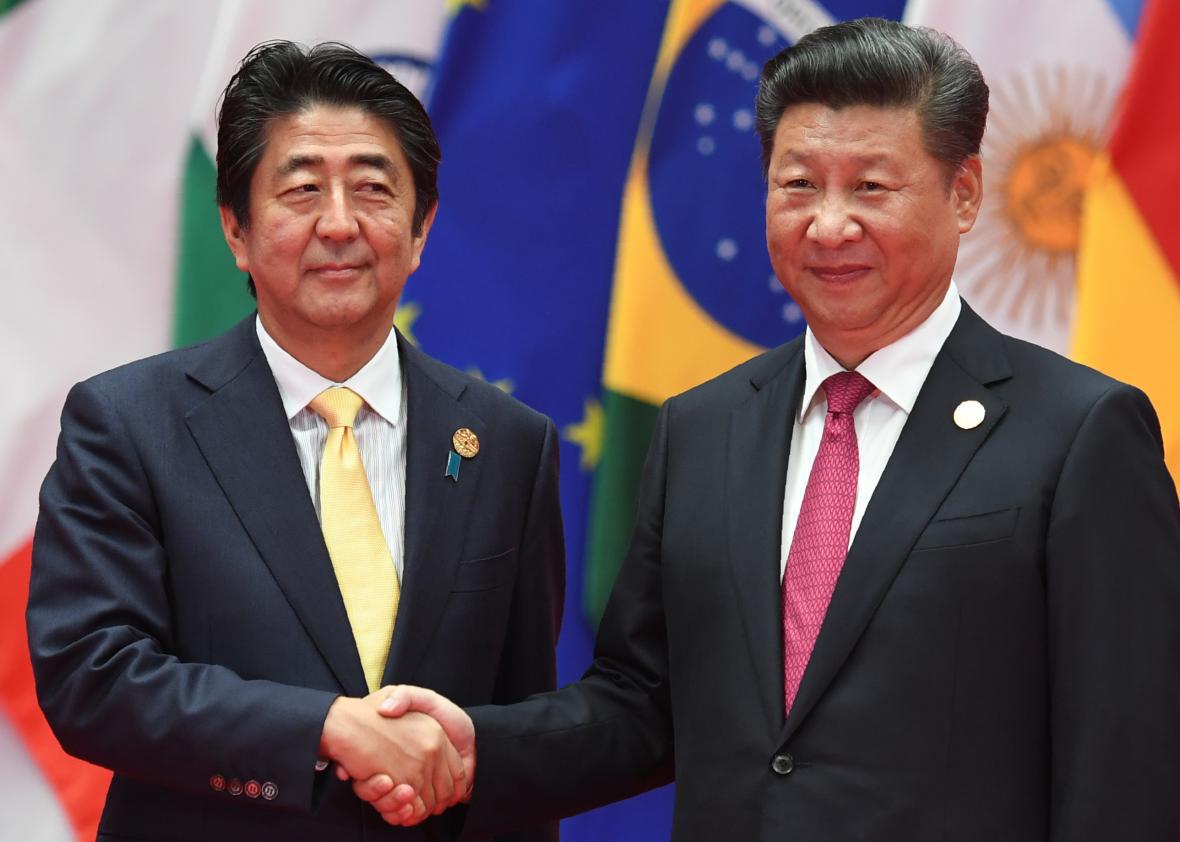Shinzo Abe’s gamble has paid off. The Japanese prime minister rolled the dice last month by calling for snap elections and was rewarded Sunday by voters who battled typhoon conditions to give his Liberal Democratic Party at least a 312-seat supermajority in the 465-seat House of Representatives. This will allow Abe to push for his long-held goal of revising Japan’s pacifist postwar Constitution. It also means that if he serves out his full term, he will become Japan’s longest-serving prime minister and will be in office for the 2020 Olympics in Tokyo.
Abe’s triumph doesn’t mean he’s particularly popular; polls show a majority of voters don’t trust Abe or even want him to remain in power. Rather, he won simply because there’s no one able to effectively challenge him. Japan’s main opposition party, the Democratic Party, split up not long before the vote. A new conservative party founded by Tokyo Gov. Yuriko Koike made some noise early on but fizzled after she announced she wasn’t running. The liberal Constitutional Democratic Party is now the main opposition force in the legislature, with 54 seats, but is a long way off from challenging the LDP, which has ruled Japan for most of the last six decades. Abe likely benefited from rising tensions with North Korea—with Kim’s missiles flying over the country, voters were looking for a steady and trusted hand.
That Japanese public is still deeply divided on Abe’s most controversial goal: amending the war-renouncing Article 9 of the Constitution. Abe hasn’t always done everything possible to reassure those worried about a return of Japanese militarism. He has said he believes Japan has apologized enough for its wartime atrocities, and he sparked anger in China and South Korea with a controversial 2013 visit to the Yasukuni Shrine, which honors Japan’s war dead, including convicted war criminals. (In recent years, he has merely sent ritual offerings rather than visiting.)
While in an ideal world, more—not fewer—countries would renounce war, there are good reasons to argue that Article 9 is out of date with an increasingly powerful China and increasingly erratic North Korea. It’s also starting to seem paradoxical, given the increasing strength and deployments abroad of Japan’s military, still euphemistically known as the Self-Defense Forces. Even the United States, the country that drafted Article 9 as an occupying power after World War II, would love to see Japan take on more security responsibilities in the region.
In an interesting bit of timing, Abe’s solidification of power comes as Japan’s main regional rival, China, is holding its twice-a-decade Communist Party Congress—the marquee event of China’s political calendar, which this year seems dedicated to demonstrating Xi Jinping’s utter domination of both party and country. The party has officially recognized what it calls “Xi Jinping Thought” in its Constitution, elevating the leader’s ideas to the level of Mao Zedong’s and Deng Xiaoping’s. China-watchers also suspect that the congress may reveal Xi’s plans to stay in power past 2023, when his next five-year term ends.
Xi has effectively purged and sidelined political rivals, cementing his personal control over the party. At the same time, the party itself has resisted pressure for political reform and weathered economic turmoil. China, meanwhile, has expanded its global presence with the “One Belt One Road” initiative—a program of global infrastructure investment in Asia and Africa that dwarfs the Marshall Plan—and staked its aggressive territorial claims in the South China Sea through a campaign of islandbuilding. Though China’s human rights practices have hardly improved, as demonstrated by the death in custody of dissident Liu Xiaobo in July, Xi’s public defenses of free trade and climate change agreements have won him some fans in the West, if only for their contrast with the rhetoric coming out of Washington these days. The Economist recently featured Xi on its cover with the headline “The World’s Most Powerful Man,” a not-so-subtle dig at President Trump.
Trump will be visiting both Abe and Xi on a whirlwind tour of Asia next month. Both have had up-and-down relationships with the erratic U.S. president. Abe misplayed his first meeting with Trump in New York during the transition period in November. It looked rushed and fruitless when Trump eventually tore up the Trans-Pacific Partnership deal. But since then they’ve been getting along better and reportedly speak frequently on the phone about North Korea. Still, Trump will likely try to pressure Japan into agreeing to a bilateral trade deal and to back his belligerent stance on North Korea, so Abe will have to play the meeting carefully. Xi has done a remarkable job at charming Trump, who seemingly never misses a chance to praise the Chinese leader, though this hasn’t stopped Trump from continuing to bash China’s trade practices and failure to sufficiently pressure North Korea.
Still, both Xi and Abe will likely be heading into those meeting with some swagger. The past week has made it clear that neither faces much in the way of domestic opposition and both will dominate East Asian politics for at least the next half-decade, if not longer. On the other hand, China and Japan are bitter regional rivals, still at odds over last century’s bloodshed and mistrustful of each other’s intentions. Given that both men believe their countries should recover past glory by projecting power internationally, the security of the region grows more tentative as each leader grows more confident.
